Business and Human Rights
- Management Approach
- Initiatives to Prevent Human Rights Abuses
- AI Ethics
- Human Rights Due Diligence
- Corrective and Remedial Measures (Grievance Mechanisms)
- Engagement with Stakeholders
Management Approach
Our Basic Stance
As value chains expand on a global scale, ensuring respect for the human rights of employees, suppliers, and all the other people involved in our businesses has become a more important focus that, in turn, increases the necessity of understanding and dealing with the human rights risks in Group-wide business activities. Based on this understanding, the Group also supports and respects international rules and norms regarding human rights and labor, including the International Bill of Human Rights, International Labour Organization’s Core Labor Standards, the Children’s Rights and Business Principles, and the United Nations Guiding Principles on Business and Human Rights, enshrined respect for human rights in business activities in the Kawasaki Group Code of Conduct, and adopted the Kawasaki Group Policy on Human Rights. The Group is a signatory to the United Nations Global Compact and supports the Ten Principles in the four areas of human rights, labor, environment, and anti-corruption. Additionally, our Group promotes initiatives to ensure respect for human rights in its business activities by conducting human rights due diligence.
Human Rights Policy
Our Group adopted the Kawasaki Group Policy on Human Rights in 2019 to complement the Kawasaki Group Code of Conduct. We revised the policy in August 2023 in response to growing societal demands for corporate human rights initiatives. Based on a recognition that it is essential for the realization of our Group Mission that the human rights of all stakeholders be fully respected and that the Kawasaki Group’s employees uphold high ethical standards, the policy stipulates that the Group will actively engage in such key issues of human rights as prohibition of forced labor and child labor, prohibition of discrimination and harassment, diversity and inclusion, approving freedom of association and the right to collective bargaining, and ensuring a safe and healthy working environment. Furthermore, we extended the Kawasaki Group Sustainable Procurement Guidelines to domestic and overseas Group companies and call upon suppliers to cooperate with us in relation to respect for human rights.
Scope of Policy Application
The Kawasaki Group and its business partners including suppliers, contractors, and agents
Structure
The Kawasaki Group Policy on Human Rights states that the responsible officer and department for human rights-related management and issues are the director in charge of sustainability and the Sustainability Department, respectively. Based on our sustainability promotion system, the Sustainability Committee chaired by the Kawasaki president and attended by all directors is responsible for deliberating on human rights-related efforts under the board of directors’ oversight. In day-to-day operations, the Sustainability Department bears responsibility and monitors human rights risks in business activities and develops preventive and corrective measures to address human rights abuses in cooperation with human resources, compliance, procurement, and other divisions of the Head office, internal companies, and subsidiaries.
Responsible Officer
Katsuya Yamamoto, Representative Director, Senior Corporate Executive Officer (in charge of sustainability)
Responsible Executive Organ and/or Committee
Sustainability Committee
Initiatives to Prevent Human Rights Abuses
Prohibition of Forced Labor and Child Labor
The Kawasaki Group Policy on Human Rights stipulates that we will not tolerate any forced labor or child labor, which are global human rights and labor issues. As a specific initiative, we start the selection process based on applications from candidates during recruitment, explain employment conditions in a language that workers can understand, and commence employment only if agreement is reached. We also prohibit the employment of workers below the legal minimum working age in each country and region where we conduct business and verify age at the time of hiring using documentation that confirms age. In addition, except when legally required, we promote efforts to avoid having employers retain original copies of worker identification documents, such as driver’s licenses and passports, during their term of employment. Regarding work duties, we prohibit workers under the age of 18 years from performing overtime work, nightwork, dangerous or hazardous tasks, and work handling heavy objects. We also guarantee workers the right to terminate the employment relationship at will.
Prohibition of Discrimination and Harassment
The Kawasaki Group Policy on Human Rights prohibits discrimination on the basis of race, skin color, gender, age, nationality, social origin, ancestry, sexual orientation, gender identity, marital status, religion, political belief, disability, health condition, or any other legally protected characteristics. As specific initiatives, Kawasaki established the Harassment Prevention Regulations, which prohibit conduct that undermines individual dignity including sexual harassment and power harassment, and provides proper guidance and raises awareness to create comfortable, harassment-free working environments. In fiscal 2024, we conducted harassment training as a part of compliance training for line managers at organizations that are part of the domestic Kawasaki Group from the perspective that harassment is also a type of compliance violation, with a total of 1,639 persons participating. In the training, we provided explanations of the specifics of harassment that occurred in the past and the resulting disciplinary actions with the aim of preventing harassment by helping participants visualize concrete scenarios. Additionally, we use the Compliance Reporting and Consultation System, a whistle-blowing system, as a consultation desk for employees who have experienced or witnessed harassment. Since fiscal 2014, we have maintained consultation points, operated by the Human Resources Division, that employees, including temporary staff, can use. As necessary, we hold meetings with employees seeking advice or help through either system and respond fairly to incidents while remaining committed to respecting their privacy. Since fiscal 2019, we have also begun operation of an external consultation point that employees of Kawasaki can access for consultation regarding issues related to harassment and mental health. If conduct constituting harassment is determined to have occurred, the offending employee is subject to disciplinary measures pursuant to the rules of employment, taking into consideration the degree of severity and other factors.
Diversity and Inclusion
The Kawasaki Group Policy on Human Rights clearly states that we will promote the creation of a workplace culture that respects individual diversity so that human resources with diverse abilities, values, and ideas can demonstrate their full capabilities, regardless of gender, age, nationality, or disability. We provide equal and fair employment opportunities, treatment, education, evaluations, promotions, and other conditions of employment to employees in accordance with the law, regardless of employment status, gender, or other such factors. We are also advancing initiatives for future improvement, such as identifying and analyzing gender pay gaps.
|
Approving freedom of association and the right to collective bargaining
The Kawasaki Group Policy on Human Rights states that the Group shall respect employees’ freedom of association and right to collective bargaining. We recognize the right to engage in appropriate union activities including labor union formation and participation as well as collective bargaining, and we prohibit adverse treatment of employees on the grounds of engaging in legitimate union activities. Kawasaki employs a union shop system, meaning that all general employees are members of the labor union. While the right to collective bargaining is recognized in our labor agreement, we have seen no collective dispute actions over the past 40 years. This is because both parties strive, in principle, to reach amicable resolutions by holding labor-management meetings (on an as-needed basis) in good faith before collective bargaining begins, with respect to such matters as corporate cost-cutting actions and significant changes in labor conditions is to take place.
Labor-Management Discussions
We have concluded a labor agreement with the labor union and actively exchange views with the union via a range of regular meetings. These include meetings of the Corporate Management Council (at least twice a year Company-wide, and at least twice a year at internal companies) to explain our corporate management policies and state of management; the Labor-Management Council (convened regularly as needed) to discuss working conditions, benefits, and other topics; the Safety and Health Council (at least once a year) to explain basic policies on safety and health; the Regional Safety and Health Committee (at least once a month) to deliberate on measures for preventing hazards and health impediments to employees; and the Company-wide Environmental Management Committee (once a year) to explain Company measures related to environmental management.
Ensuring a Safe and Healthy Working Environment
The Kawasaki Group Policy on Human Rights clearly states that we will conduct appropriate working time management and guarantee the right to time off to ensure that employees can work in good physical and mental health. We implement measures to prevent work-related accidents, reduce the need for sick leave, and encourage employees to improve lifestyle habits in order to maintain safety, sanitation, and health in an effort to ensure that all employees can work with peace of mind. We prioritize the prevention of workplace accidents that result in absence from work and strive to improve safety management activities intended to reduce the lost time injury frequency rate. We also properly manage working hours and guarantee employee rights through measures such as granting annual paid leave and paying overtime wages to employees who work overtime.
|
Company Manufacturing Sites Undergo RBA VAP Audits
Kawasaki Heavy Industries’ Robot Business Division has achieved the highest evaluation of “Platinum Status” in the Validated Assessment Program (VAP), a third-party audit that evaluates compliance with the RBA* Code of Conduct. For VAP audits, an RBA-certified third-party organization evaluates compliance with the standards through criteria and management systems related to ensuring safe workplaces, respectful and dignified treatment of workers, responsible environmental management, and ethical business practices as provided in the RBA Code of Conduct, and a status is issued based on the evaluation score. In the fiscal 2024 audit, our Robot Business Division at the Akashi Works and Nishi-Kobe Works was recognized for its proper management and operation in the fields of labor, health, safety, environment, ethics, and management systems. We achieved a perfect score of 200 points, earning the highest evaluation of Platinum Status.
* Responsible Business Alliance: An international initiative to promote corporate social responsibility in global supply chains.
Initiatives to Prevent Human Rights Abuses in Defense-related Businesses
Aware of the CSR obligations attendant to involvement in national security-related businesses, our Company formulated corporate ethics-based in-house rules regarding the provision of products and services. In addition to ensuring compliance with laws and regulations associated with security trade and export control, these corporate ethics-based rules are designed to help employees judge the propriety of how purchasers put our products and technologies to actual use and thereby prevent such products and technologies from being used in unintended manners. Furthermore, the Kawasaki Group Code of Conduct states that “We do not provide products and technologies for unethical purposes of use” and requires that Group members be aware of the ethical responsibilities associated with the provision of Group products and technologies.
Employee Education about Business and Human Rights
Our Company has conducted e-learning for employees about business and human rights since fiscal 2020. This training includes an overview of international norms and global trends relating to human rights and labor and explanations of corporate responsibility and the Group’s human rights policies and initiatives. In fiscal 2024, the training was conducted for domestic employees, and 11,627 employees participated.
AI Ethics
Policy on AI Ethics
The Kawasaki Group aims to realize a sustainable society in harmony with the global environment by leveraging our advanced comprehensive technological capabilities cultivated in a wide range of fields covering land, sea, and air. And in order to meet the diverse needs of customers around the world, we will create new value with both originality and innovation and contribute to the formation of a rich and beautiful society of the future. To this end, we will promote the use of AI, a powerful tool, to make it more supportive and fulfilling for employees to work, and to build a society where humans and AI coexist. And, recognizing the significant impact of AI on society, we will strive to realize a safe and secure society in which human dignity is protected. To promote these activities, the Kawasaki Group AI Ethics Policy was adopted in July 2025 following approval by the Board of Directors. This policy organizes the matters that the Group must comply with as we expand the development and use of AI-related technologies in the future.
Human Rights Due Diligence
The Kawasaki Group established a human rights due diligence process based on the Kawasaki Group Policy on Human Rights with the objective of identifying, preventing, and mitigating adverse impact on human rights resulting from our corporate activities, and we are working to embed use and enhance the effectiveness of the PDCA cycle. Specifically, we assess the impact of identified human rights risks based on the Group’s business activities and endeavor to take appropriate action to prevent and mitigate human rights risks based on the results. We also conduct ongoing monitoring including follow-up surveys relating to the status of implementation of corrective actions and ongoing impact assessments on human rights risks.
Human Rights Due Diligence Process
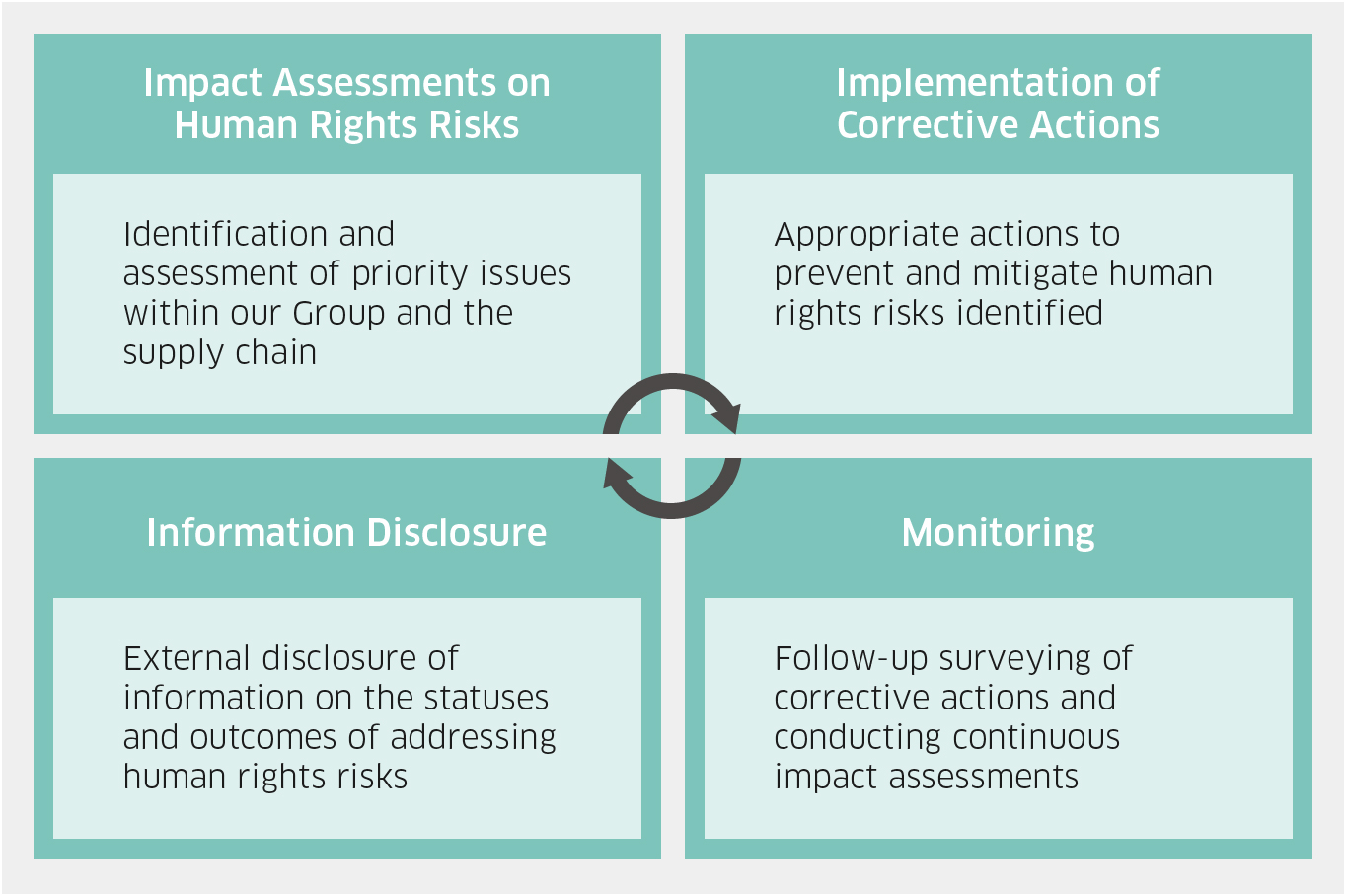
Human Rights Risk Assessments and Impact Assessments
In fiscal 2018, our Group implemented human rights risk assessments and impact assessments of its main businesses in cooperation with the U.S.-based nonprofit Business for Social Responsibility (BSR). In implementing these risk assessments and impact assessments, Kawasaki referenced international rules and principles regarding human rights, namely, the Universal Declaration of Human Rights, the ILO Declaration on Fundamental Principles and Rights at Work, the International Bill of Human Rights, and the United Nations Guiding Principles on Business and Human Rights.
Scope of Human Rights Risk Assessments and Impact Assessments (businesses, value chains, countries and regions, stakeholder groups)
Businesses covered:
Our Group’s main business
Countries and regions covered:
The countries and regions in which our Group does business (Japan, China, the United States, the United Kingdom, Brazil, Thailand, the Philippines, Singapore, Malaysia, Indonesia, Australia, Germany, the Netherlands, Russia)
Stakeholders covered:
Customers, employees, employees in the supply chain, local residents, etc.
Assessment Results (priority human rights risks)
As a result of the risk assessments and impact assessments, we found that the following nine areas in particular present significant human rights risks. Based on these results, we formulate risk mitigation measures for priority issues within the Group and its supply chains and strive to make improvements.
- Safety and health of employees
- Safety and health at manufacturing sites
- Child labor at manufacturing sites
- Forced labor at manufacturing sites
- Safety and health in supply chains
- Wages, benefits, and work hours in supply chains
- Child labor in supply chains
- Forced labor in supply chains
- High-risk customers
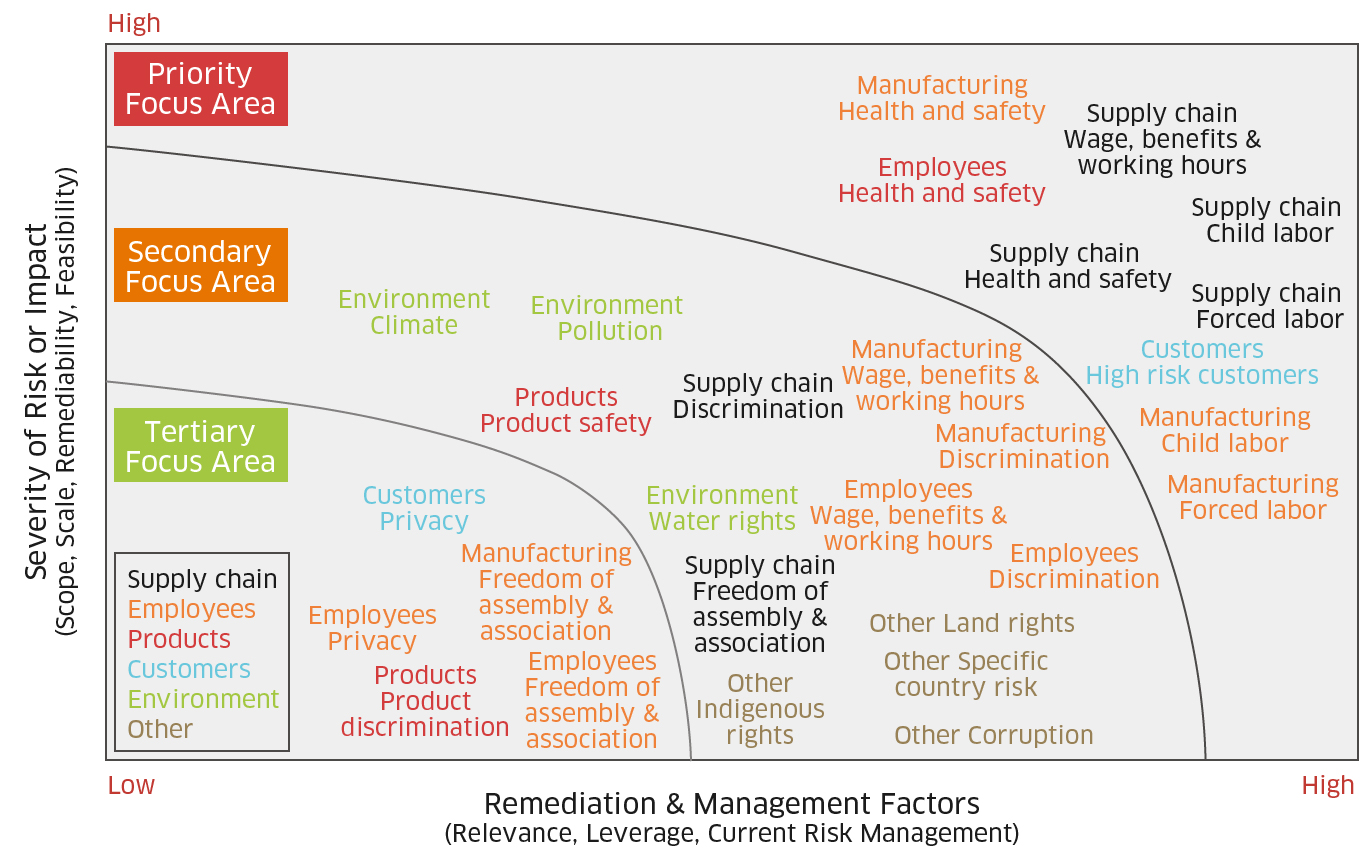
Assessment of Group Companies
From fiscal 2014 to fiscal 2023, we used the Confirmation and Declaration of the Abolition of Forced Labor and Child Labor, which was prepared based on the business guidelines relating to the labor principles of the United Nations Global Compact to confirm that no child labor or forced labor was taking place anywhere throughout the Group. In addition, the president of each Group company signed the confirmation and declared that no child labor or forced labor will be permitted in the future. Starting in fiscal 2022, we conduct surveys of Group companies using a risk-based approach, utilizing a self-assessment questionnaire (SAQ) prepared by Kawasaki to address the five sections stipulated in the RBA Code of Conduct (labor, health and safety, environment, ethics, and management systems). In fiscal 2022, we conducted surveys using SAQs and held online meetings with six overseas Group companies located in countries where human rights risks are considered to be high. In fiscal 2023, we conducted surveys using SAQs of four overseas Group companies that perform production in other countries, and in fiscal 2024, we surveyed 45 domestic Group companies using revised SAQs. Going forward, we plan to continue periodic monitoring of domestic and overseas Group companies using SAQs.
Corrective Measures Based on Survey Results
The results of the surveys of overseas Group companies conducted in fiscal 2022 and fiscal 2023 did not identify any issues that constituted violations of laws or regulations relating to labor, health and safety, the environment, or ethics requiring emergency responses or violations of human rights constituting forced labor or child labor. In the areas of the environment, ethics, and management systems, however, we requested a total of five companies to individually make improvements concerning the implementation status of training, management systems, and other issues. We later conducted follow-up surveys, confirming that corrective measures have been taken at four of the five companies as of the end of fiscal 2024. The results of the surveys of domestic Group companies conducted in fiscal 2024 similarly did not identify any issues requiring emergency responses or human rights violations, but requests were made to a total of five companies concerning safety and health emergency preparedness and management system communications. Going forward, we will continue to follow-up on the status of measures by the companies that were requested to make improvements.
|
Implementation Status of Human Right Risk Assessments (Our Group)
(FY)
| Unit | 2020 | 2021 | 2022 | 2023 | 2024 | |
|---|---|---|---|---|---|---|
| Number of companies subject to the Confirmation and Declaration of the Abolition of Forced or Compulsory Labour (a)*1 | Companies | 14 | 43 | 24 | 23 | - |
| Number of companies subject to survey using SAQs (b) | Companies | - | - | 6 | 4 | 45 |
| Number of companies subject to requests for improvement*2 | Companies | - | - | - | 5 | 5 |
| Number of companies surveyed in the past three years (c)*3 | % | - | - | 85.3 | 97.1 | 96.2 |
*1 Implemented through fiscal 2023
*2 Group companies surveyed using SAQs
*3 (c) = Total number of companies (a) + (b) in the past three years/number of Group companies in the most recent fiscal year × 100
Assessment of the Human Rights Impacts Connected to Workers at Overseas Group Sites
Based on the results of monitoring based on SAQ focused on overseas Group companies, we conducted direct interviews with managers and workers at Kawasaki Motors Enterprise (Thailand) Co., Ltd. (KMT) and PT. Kawasaki Motor Indonesia (KMI), in May 2024 and January 2025, respectively, with the goal of assessing whether there were any actual or potential human rights risks and the degree of their impact. For the worker interviews, 50 individuals were selected in an all-encompassing way based on gender, department, and employment status (full-time worker, temporary worker, and trainee). As to implementation, grounded in the Dhaka Principles (principles for the responsible recruitment and employment of migrant workers) and based on a questionnaire covering human rights issues that workers face, the third-party non-profit organization Caux Round Table Japan (CRT Japan) conducted an interview-based survey prioritizing items with particular relevance to the attributes of the workers and the environments in which they were placed.
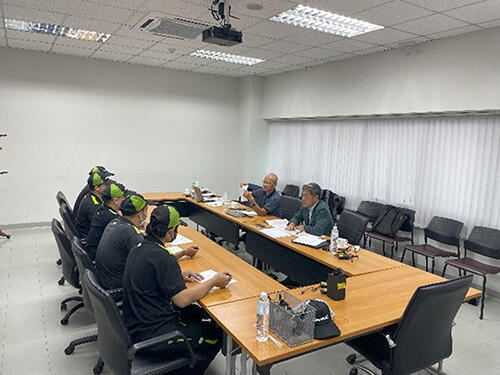
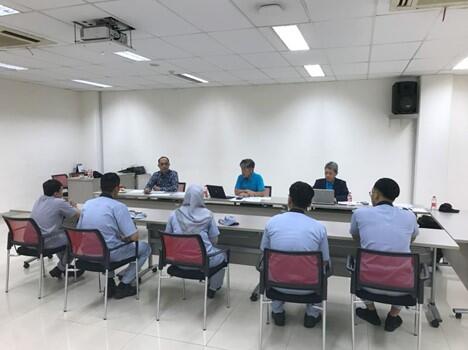
Corrective Measures Based on Impact Assessment Results
The results of the interviews conducted at KMT and KMI were generally good, and no human rights violations, such as forced labor or workplace discrimination, were identified. Both companies will make use of the opinions of workers who requested improvements during interviews and will continue working on the establishment of employment and working environments where worker rights are more respected as well as reinforcement of feedback to workers to build even stronger relationships based on trust.
Corrective and Remedial Measures (Grievance Mechanisms)
Reporting and Consultation Points for Employees
Under Kawasaki’s labor agreement, if a problem arises that cannot be resolved within the workplace, Kawasaki sets up a grievance committee, with participation from the Officer responsible for personnel and the president of the labor union, to quickly, fairly, and peacefully resolve the problem. The grievance committee handles a wide variety of issues, including the health management and safety of union members, incidents of abuse of authority or sexual harassment, and matters related to personnel transfers. Kawasaki promises that no employee will suffer disadvantageous treatment for voicing a grievance.
| Consultation system | Contents of report or consultation | Contact method | Contact point/Operating division | Scope |
|---|---|---|---|---|
| Internal consultation point system | Workplace harassment, such as sexual harassment, abuse of authority, and maternity-related harassment | Head Office Human Resources Division / Head Office Human Resources Division | Kawasaki Heavy Industries, Kawasaki Railcar Manufacturing, Kawasaki Motors | |
| External consultation point system | Harassment and mental health | Webpage, phone | External institution / Head Office Human Resources Division | Kawasaki Heavy Industries, Kawasaki Railcar Manufacturing, Kawasaki Motors |
| Compliance Reporting and Consultation System | Please refer to Whistle-Blowing System and Consultation Points. | Outside lawyer / Compliance Department | Kawasaki Group (domestic and some overseas locations) | |
External Reporting and Consultation Points (for Suppliers, Local communities, etc.)
The Kawasaki Group has established a dedicated service desk for all officers and employees of our suppliers and those in our supply chain for products and services in Japan. The supplier hotline also fields grievances related to human rights. In addition, our website includes contact forms from which general inquiries can also be fielded. In accordance with policies on handling of personal information, we respond to each inquiry received by providing information to the relevant departments and taking appropriate action to ensure that the whistleblower and the company with which the whistleblower is affiliated are not treated disadvantageously. Anonymous reports and inquiries are also accepted.
Japan Center for Engagement and Remedy on Business and Human Rights (JaCER)
Since fiscal 2024, our Group has joined as a regular member of the Japan Center for Engagement and Remedy on Business and Human Rights (JaCER), which provides an external engagement and remedy platform. Besides our existing internal and external consultation point systems, our group will receive complaints and grievances related to human rights from a wide range of stakeholders including overseas suppliers through JaCER’s platform and endeavors to improve access to remedies and redress grievances by leveraging the expertise of third parties.
Number of Reports from Outside Stakeholders (Kawasaki Group)
(FY)
| Unit | 2021 | 2022 | 2023*1 | 2024*2 | |
|---|---|---|---|---|---|
| Number of reports | Reports | - | - | 7 | 19 |
*1 Number of reports to the supplier hotline
*2 Total number of reports to the supplier hotline and JaCER
Engagement with Stakeholders
The Kawasaki Group Policy on Human Rights, established in fiscal 2019, states that the Group will fulfill its responsibilities related to respecting the human rights of the stakeholders impacted by the Group’s business activities.
In Response to the NGO SOMO’s Report
In 2017, the Netherlands-based NGO SOMO published a report titled The Myanmar Dilemma, discussing human rights abuses in garment factories in Myanmar, including a factory reported to be a supplier to Kawasaki. In light of this report, we conducted an internal investigation and determined that a primary contractor commissioned by Kawasaki subsidiary Kawasaki Motors Corporation Japan to manufacture apparel products subcontracted the production of some of these products to the factory discussed in SOMO’s report. The manufacture of these products at said factory was temporary, and the products were not being produced there at the time of the internal investigation. The responsible department provided explanations of potential human rights risks in the supply chain to related divisions and requested that they take steps to ensure awareness of and compliance with the Kawasaki Group Sustainable Procurement Guidelines. We internally share the observations and opinions of NGOs and other stakeholders and strive to respond appropriately when there is an issue.
Addressing Modern Slavery Act
Response to the UK Modern Slavery Act and Australian Modern Slavery Act
Our UK-based subsidiary Kawasaki Precision Machinery (UK) Ltd. and the UK Branch Office of Kawasaki Motors Europe N.V. issue statements in accordance with the United Kingdom’s Modern Slavery Act. Kawasaki Motors Pty. Ltd., a subsidiary located in Australia, has issued a formal statement responding to Australia’s Modern Slavery Act.
Topic
Consideration Given to Employees at KMI (Indonesia)
PT. Kawasaki Motor Indonesia (KMI) is a local manufacturing and marketing base for Kawasaki-brand motorcycles in Indonesia. About 90% of the population of Indonesia is Muslim, and many of KMI’s employees are followers of Islam. To accommodate these employees, they are extended religious considerations. For example, the company created an on-site mosque or mushola for prayer. Female employees may wear a hijab during working hours and, in the cafeteria, no dishes made with pork are served, since Islamic dietary laws prohibit consumption of pork. During the holy month of Ramadan, when Muslims fast from sunrise and sunset, working hours for the Marketing & Sales Department are moved up by 30 minutes from the usual 8:00 am – 5:00 pm to 7:30 am – 4:30 pm to accommodate the desire of many Muslims to have their evening meal with family at home during Ramadan. Also, after the post-Ramadan celebration of Lebaran (a celebration to mark the end of fasting) they hold a Halal Bi Halal event for Muslims. However, Islam is not the state religion of Indonesia and the constitution guarantees religious freedom. Holidays of other religions, such as Christianity, Hinduism, and Buddhism are also observed as national holidays, and KMI holds ceremonies on Christmas, the Day of Silence, and Buddha’s Birthday in consideration of employees who practice minority religions. In this way, KMI conducts business in a way that respects the human rights of its employees while accommodating local religions, cultures, and customs.
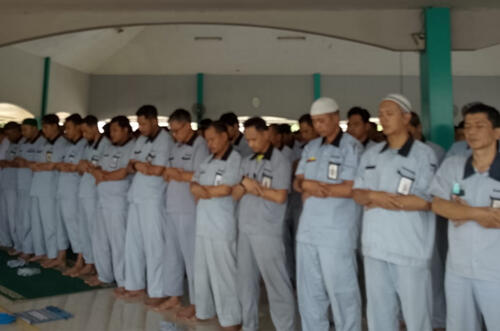 |
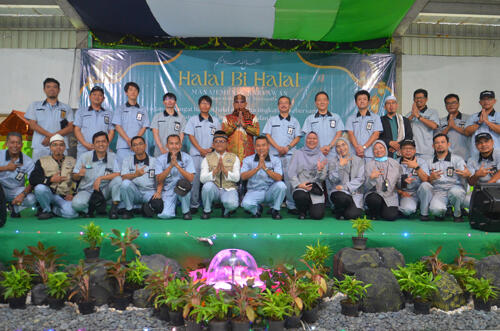 |
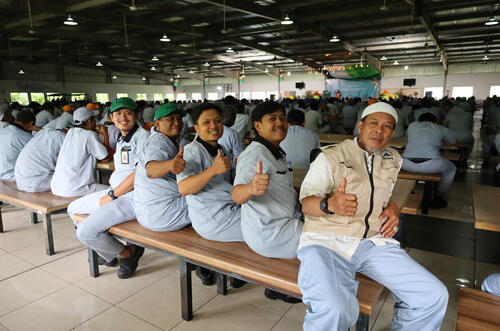 |
| On site prayer room (mosque) | Halal Bi Halal | |
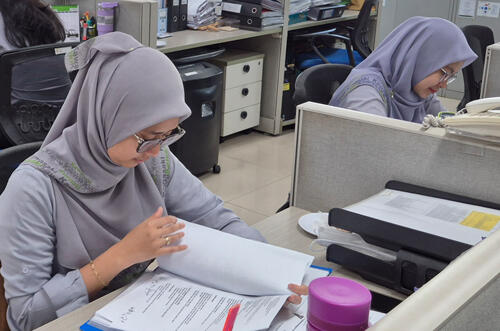 |
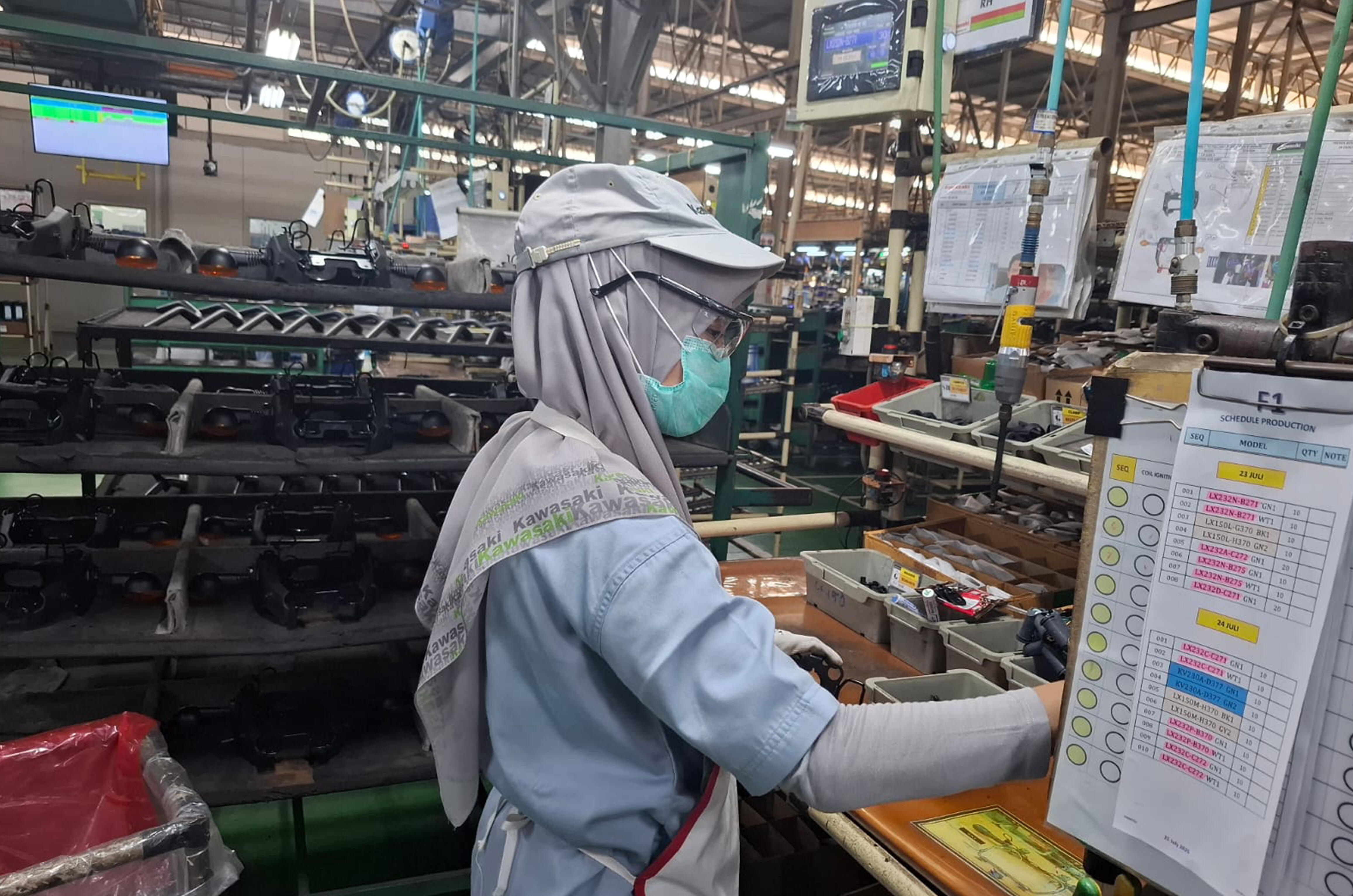 |
|
| Female employees wearing hijabs | ||
Contact
If you need more information about our business,
please feel free to contact us.





